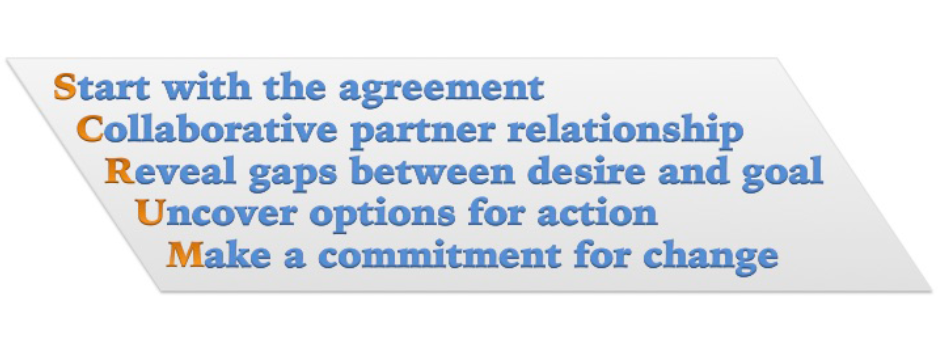A Coaching Model Created by Gary Moore
(Agile & Life Coach, UNITED STATES)
Inspired by the Scrum Framework
The most widely adopted Agile framework in use today is the Scrum Framework(1). As described in The Scrum GuideTM(2), at the core of the Scrum Framework are its values of commitment, courage, focus, openness and respect2. It can be said that these same values are present between the coach and the client within the coaching relationship:
The focus of the coaching session as determined by the client; the courage and openness evidenced by the client during the session; the respect evidenced between the coach and client; and the commitment the client makes for change and growth.
In addition to these shared values are the shared principles of collaboration, transparency, inspect and adapt cycles, embracing change, ongoing learning, and accountability.
Though the Scrum Framework was initially conceived for software development, a growing list of domains have recognized the benefits of these values, principles and practices including financial services, government, healthcare, manufacturing, education, and non-profit organizations.
Professional coaching is ripe for inclusion in this growing list.
The name of the Scrum Framework is based on a metaphor of how well a Rugby team collaborates in an effort to return the ball back into play or gain control of the ball (i.e. the scrum).
The SCRUM Coaching Model is based on an acronym representing the coaching process.
SCRUM Coaching Model

SCRUM Coaching Model
▼ Start with the agreement
▶ Perhaps the most crucial element of the coaching session is the coaching agreement. The coaching agreement is established during the early stages of the session and helps guide and measure the coaching session.
▶ The coaching agreement identifies what the client wants to focus on; what is most important to the client about the topic; what would indicate to the client that the coaching session was worthwhile, valuable, or had a successful outcome; and if there are any known impediments that need to be addressed or resolved.
▶ It also provides the coach the opportunity to begin building a relationship of trust and respect, and to help the client understand the coaching process.
SCRUM Coaching Model
▼ Collaborative partner relationship
▶ Another core competency(3) of the coaching profession is the coach’s responsibility to create an environment of safety that encourages trust and intimacy between the coach and client up front.
▶The coach will demonstrate confidentiality, respect and support for the client. Establishing expectations for openness and honesty with the client is needed.
▶These actions will support a strong foundation of partnership and collaboration with the client.
SCRUM Coaching Model
▼ Reveal gaps between desire and goal
▶ During the coaching conversation the coach will demonstrate the practices of being completely present, active listening, being curious and flexible while holding the client’s agenda.
▶Through powerful questioning, the coach will support the client as they discover the gaps between desiring an outcome, and making goals to actually achieve it.
▶ Engaging in exploration for discovery, perspective and learning provides new or increased awareness for the client.
SCRUM Coaching Model
▼ Uncover options for action
▶ Towards the end of the coaching session, the coach will partner with the client to develop a plan with SMART goals.
▶ SMART goals in coaching are Specific, Measurable, Attractive, Realistic, and have Target dates.
▶ The coach will collaborate and partner with the client as they problem-solve and discover options and alternatives that they might put into action going forward.
SCRUM Coaching Model
▼ Make a commitment for change
▶ By the end of the coaching session, the coach supports the client as they summon the courage to identify which options they could put into action.
▶ The coach will encourage the client to identify which option they will make a commitment to put into action going forward.
▶ The coach will help the client stay focused on what they established is important to them, and hold the client accountable for their commitments.
Summary
The SCRUM Coaching Model incorporates the shared values of both professional coaching and the Scrum Framework, provides a roadmap of the coaching session, and encourages the coach to enact fundamental coaching core competencies. Therefore, it is suitable for use in any coaching practice. And, since the model is inspired by the values of the Scrum Framework, it is very compatible for use in organizations that have adopted Scrum and other Agile methods to benefit individuals, teams, and the entire organization.
References
1. 12th Annual State of Agile Report; CollabNet/VersionOne
2. The Scrum GuideTM; Ken Schwaber and Jeff Sutherland
3. ICF Core Competencies; International Coach Federation
<<Find out more about how to create your own Coaching model at ICA>>